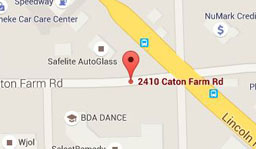What You Need to Know About Caring for Your Dental Implant
If you’re missing one or more teeth, your dentist may recommend a dental implant. An implant is a metal post that replaces your missing tooth’s root. It attaches to your jaw, providing a foundation for a replacement tooth.
Caring for your implant is similar to caring for your natural teeth, but there are some important differences.
Why Do You Need to Care for Your Implant?
Since an implant isn’t a natural bone like your other teeth, you may wonder why you need to clean and care for it.
Plaque can build up around your implant just as it can around your natural teeth roots. If you don’t remove this plaque, an infection can develop around your implant. This infection can cause your implant to become unattached from your gums. Not only can it cause you to lose your implant, but it could cause you to lose the surrounding bone as well.
In fact, the area surrounding your implant can be more disease-prone than other areas in your mouth. That’s because your implant doesn’t have the same blood vessel supply that a natural tooth enjoys, so it’s not as resistant to infection. Thus, it requires special care.
Caring for your implant requires care both at home and in the dentist’s office.
How Can You Care for Your Implant at Home?
Right after your implant surgery, avoid hot food and drinks. You’ll notice swelling and soreness for a few days, which you can relieve with ice packs. You may also have some bleeding, which you can relieve with gauze. Your dentist may recommend a special mouthwash or prescribe an antibiotic after your surgery.
Throughout your life, you’ll need to care for your implant to prevent infection and other problems.
While you brush your teeth twice a day, you should also brush on and around your artificial tooth and all the surfaces around your implant. It’s important to use gentle equipment so you don’t damage your implant or crown. Choose a soft toothbrush, and avoid abrasive toothpastes and tooth cleaners like baking soda, smoker’s toothpaste, and stain removers. These cleaners could damage your implant’s surface.
Using an interdental brush can help you clean between and around the teeth. To avoid scratching your implant, choose an interdental brush made of nylon, not wire.
You should also floss the space next to and around your artificial tooth, just as you do your other teeth. Make sure you floss the crevice between the tissues that surround the implant. This is a likely place for inflammation and disease to develop. Wrap the floss in a circle around your tooth, cross it in front, and move it gently into the crevice. Unwaxed floss is less likely to damage the sensitive tissue around your implant.
To prevent infection, your dentist may recommend that you use an antimicrobial mouth rinse as well. Avoid smoking, which can increase your risk of infection.
As you care for your implant at home, look for any problems with it, such as:
Inflammation or swelling in the mouth, gums, or sinuses
Loose implant or crown
Pain, numbness, or tingling in the gums, cheek, lips, tongue, or chin Bleeding
These symptoms could be signs of infection, nerve or tissue damage, or another problem. If you notice any of these problems, see a dentist right away for a treatment plan.
How Can You Care for Your Implant in the Dentist’s Office?
When you visit the dentist’s office for your twice-yearly dental cleanings, your dental hygienist will clean on and around your implant. They’ll remove plaque on and around your implant just as in other areas of your mouth.
Metal instruments can scratch your artificial tooth, so your hygienist should use resin or plastic instruments instead. Your dental hygienist may use vibrating instruments to remove any debris around your implant.
When your dentist examines your teeth, he or she should look closely around your implant for signs of infection. If he or she can see your implant, you may have an infection that causes you to lose bone or gum.
If you have an infection, your dentist will clean the area, removing any food or debris trapped around your implant. He or she may use a disinfecting solution, prescribe antibiotics, or suggest at-home microbial therapy. Microbial therapy involves applying an antimicrobial solution to the area twice a day for three to six weeks.
Rarely, your body may reject the implant or it may break. If this happens, your dentist may be able to build up the tissue around your implant. If rebuilding isn’t possible, your dentist will need to remove the implant and allow the area to heal before placing a new implant.
Dental implants can restore your smile and help you smile confidently once again. But dental implants may require even more care than your natural teeth do. Call Crest Hill Family Dental for an appointment to discuss whether implants are right for you.

